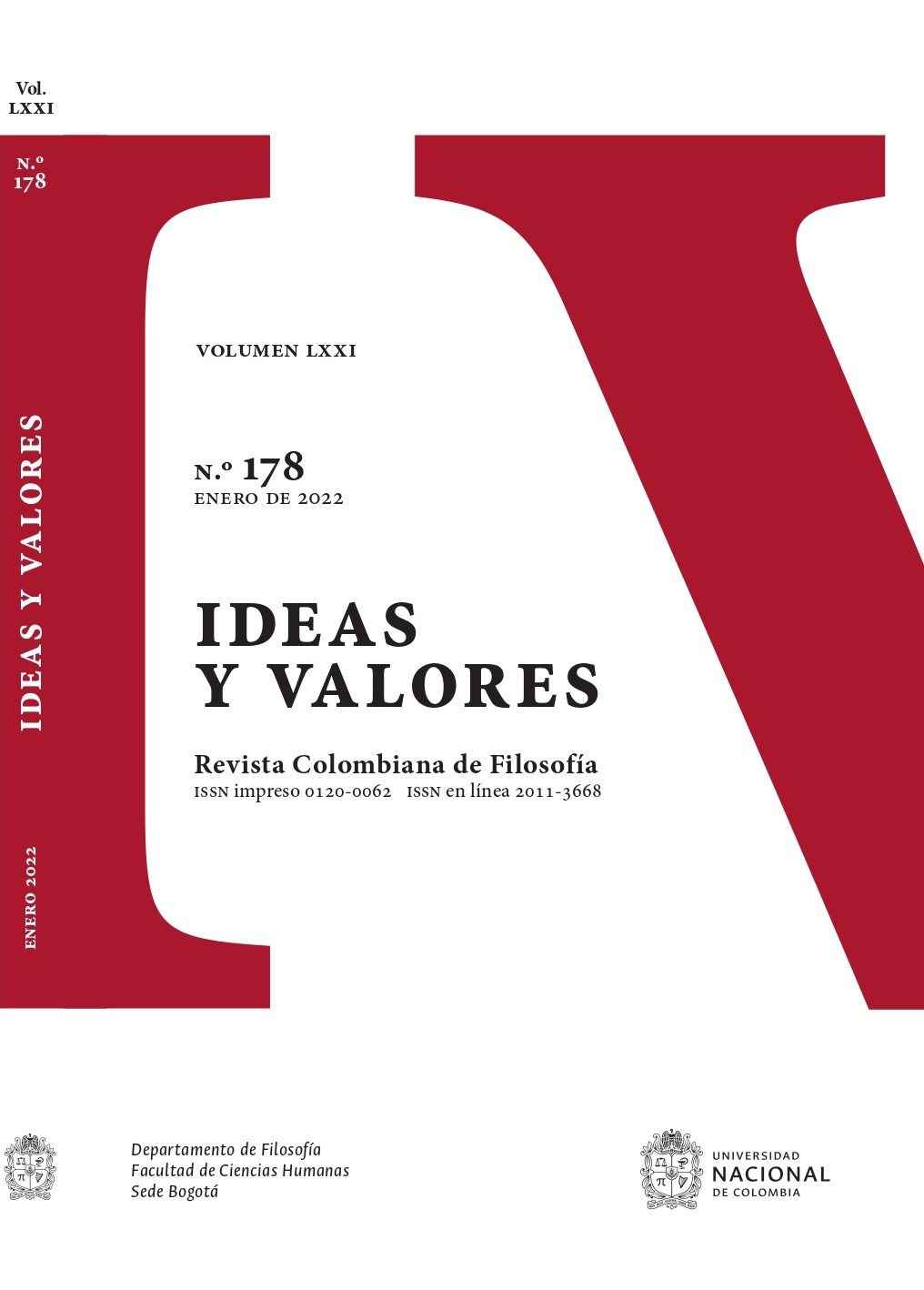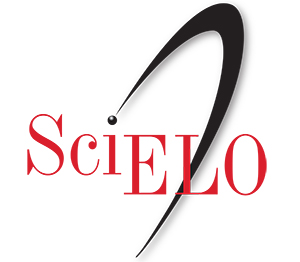El melancólico ensimismamiento. ¿Un problema consigo mismo o una aporía en el sí mismo?
The Melancholic Self-Absorption. A Problem with Itself or an Aporia in the Self?
DOI:
https://doi.org/10.15446/ideasyvalores.v71n178.100768Keywords:
melancolía, autoanulación, desesperación, endogeneidad, aporía (es)melancholy, self-annulment, despair, endogeneity, aporía (en)
Downloads
Este artículo se propone pensar el ensimismamiento característico de la melancolía en vistas a comprender su particular endon. Siguiendo las discusiones que ha mantenido la psiquiatría fenomenológica con las tesis heideggerianas sobre el miedo y la angustia, intentaremos mostrar que la melancolía, pese a poder ser entendida como un retraimiento del mundo y como una relación consigo mismo de autorreproche, puede ser pensada también como una condición vital que radicaría en un movimiento de autoanulación albergado en la propia relación del existir consigo, mientras se despliega en el mundo. Así, se esbozará una reflexión en la que la melancolía pueda ser entendida como una aporía a partir de las consideraciones kierkegaardianas sobre la desesperación en cuanto enfermedad mortal.
This paper aims to think about the characteristic self absorption of melancholy in order to understand its particular endon. Following the discussions that phenomenological psychiatry has maintained with heideggerian theses about fear and anguish, we will try to show that melancholy, despite being understood as a withdrawal from the world and as a reproachful relationship whith itself, can also be thought as a vital condition that resides in a movement of self-annulment housed in the own relation of existence to itself, while this one unfolds in the world. Thus, it will be outlined a reflection in which melancholy can be understood as an aporia from the Kierkegaard’s considerations on despair as a deadly disease.
References
Aristóteles. Ética a Nicómaco. Madrid: Alianza, 2012.
Aristóteles. El hombre de genio y la melancolía. Problema xxx. Barcelona: Acantilado, 2007.
Berlanga, C. “El trastorno depresivo evaluado bajo una perspectiva fenomenológica.” Salud Mental 22 (1999): 26-32.
Binswanger, L. “Melancholie und Manie.” Ausgewählte Werke 4. Heidelberg: Asanger, 1994. 351-428.
Blankenburg, W. “Vitale und existentielle Angst.” Das Angstphänomen: Pathologie, Genese und Therapie. Eds. Hermann Lang y Hermann Faller. Frankfurt a. M.: Suhrkamp, 1996. 43-73.
Bollnow, O. Das Wesen der Stimmungen. Würzburg: Königshausen & Neumann, 2009.
Boss, M. “The conception of man in Natural Science and Daseinsanalysis.” Comprehensive Psychiatry 3 (1962): 193-214. DOI: https://doi.org/10.1016/S0010-440X(62)80021-2
Boss, M. Existential Foundations of Medicine & Psychology. Trad. Stephen Conway y Anne Cleaves. New York; London: Jason Aronson, 1983.
Burton, R. Anatomía de la melancolía. Madrid: Alianza, 2015.
Condrau, G. “Zur Phänomenologie der Angst.” Das Angstphänomen: Pathologie, Genese und Therapie. Eds. Hermann Lang y Hermann Faller. Frankfurt a. M.: Suhrkamp, 1996. 32-42.
American Psychiatric Association-apa. Diagnostic and statistical manual of mental disorders. 5.a ed. (dsm-v). Arlington: American Psychiatric Publishing, 2013. DOI: https://doi.org/10.1176/appi.books.9780890425596
Freud, S. “Trauer und Melancholie.” Die Wahnwelten (endogene Psychosen). Eds. Erwin Straus y Jürg Zutt. Frankfurt a. M.: Akademische Verlagsgesellschaft, 1963. 323-336.
Fuchs, T. “Psychopatology of depression and mania: symtoms, phenomena and síndromes.” Journal of Psychopatology 20 (2014): 404-413.
Fuchs, T. “The phenomenology of body, space and time in depression.” Comprendre 15 (2005): 108-121.
Heidegger, M. Sein und Zeit. Tübingen: Max Niemeyer, 2001.
Heidegger, M. Phänomenologie des religiösen Lebens. Frankfurt a. M.: V. Klostermann, 1995.
Heidegger, M. Zollikoner Seminare. Frankfurt a. M.: V. Klostermann, 1994.
Kierkegaard, S. La enfermedad mortal. Madrid: Trotta, 2008.
Kraus, A. “Spezifität melanscholicher Verstimmung und Angst.” Das Angstphänomen: Pathologie, Genese und Therapie. Eds. Hermann Lang y Hermann Faller. Frankfurt a. M.: Suhrkamp, 1996. 103-121.
Maldiney, H. “L’existence en question dans la dépression et dans la mélancholie.” Penser l’ homme et la folie. Eds. Marie-Claude Carrara y Jérôme Millon. Grenoble: Millon, 2007. 63-85.
Rovaletti, M. L. “Del ensimismamiento a la melancolía. La perspectiva antropológica de Ortega y Gasset.” Revista de Neuro-Psiquiatría 66 (2003): 63-72. DOI: https://doi.org/10.20453/rnp.v66i1.1527
Straus, E. “Das Zeiterlebem in der endogenen Depression und in der psychopatischen Verstimmung.” Die Wahnwelten (endogene Psychosen). Eds. Erwin Straus y Jürg Zutt. Frankfurt a. M.: Akademische Verlagsgesellschaft, 1963. 337-251. Tellenbach, H. Melancholie: Problemgeschichte-Endogeneität, Typologie-Pathogenese- Klinik. Berlin: Springer, 1983.
Vázquez, F., Muñoz, R. F., y Becoña, E. “Depresión: diagnóstico, modelos teóricos y tratamiento a finales del siglo xx.” Psicología Conductual 8 (2000): 417-449.
Von Gebsattel, “Die Störungen des Werdens und des Zeiterlebens im Rahmen psychiatrischer Erkrankungen.” Die Wahnwelten (endogene Psychosen). Eds. Erwin Straus y Jürg Zutt. Frankfurt a. M.: Akademische Verlagsgesellschaft, 1963. 352-369.
How to Cite
MODERN-LANGUAGE-ASSOCIATION
ACM
ACS
APA
ABNT
Chicago
Harvard
IEEE
Turabian
Vancouver
Download Citation
License
Copyright (c) 2022 Los derechos son del autor(es), quien(es) puede re-publicar en parte o en su totalidad el documento ya publicado en la revista siempre y cuando se dé el debido reconocimiento a Ideas y Valores

This work is licensed under a Creative Commons Attribution-NonCommercial-NoDerivatives 4.0 International License.
The Creative Commons Attribution-NonComnercial-No Derivatives 4.0 Internacional License authorizes copying and redistributing the material in any means or format, provided that credit is granted to the authors and to Ideas y Valores as the source of the original publication. Copying or distributing the contents of the journal for commercial purposes is not allowed; neither is the adaptation, derivation, or transformation of the contents, without previous authorization by the authors and the editors of Ideas y Valores. For further information regarding the terms of this license, please consult http://creativecommons.org/licenses/by-nc-nd/4.0/legalcode.







1.jpg)
.png)


1.png)
.png)
.png)
.jpg)

.png)









